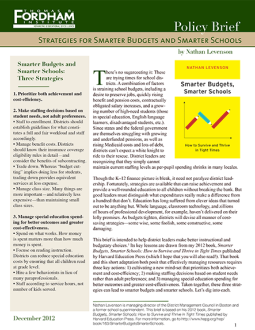This policy brief by Nathan Levenson, Managing Director at the District Management Council and former superintendent of the Arlington (MA) Public Schools, offers informed advice to school districts seeking to provide a well-rounded, quality education to all children in a time of strained budgets. Levenson recommends three strategies:
1. Prioritize both achievement and cost-efficiency.
Allocating scarce resources effectively means funding what works and obtaining ample information before making funding decisions, including information about what drives achievement—and drives it cost-effectively.
2. Make staffing decisions based on student needs, not adult preferences.
Districts should establish guidelines for what constitutes a full and fair workload for staff members, then staff accordingly. This may include “trading down” to less-expensive services of equivalent quality, considering alternatives to maintaining class sizes, and closely monitoring insurance eligibility.
3. Manage special education spending for better outcomes and greater cost-effectiveness.
How money is spent matters more than how much is spent; that’s true for special education, too. Districts can reduce their special-education costs by ensuring that all children read at grade level; hiring a few behaviorists in lieu of many paraprofessionals; and staffing according to service hours, rather than numbers of students served.
To learn more, download and read the full policy brief.



